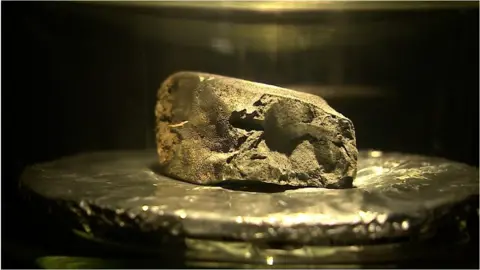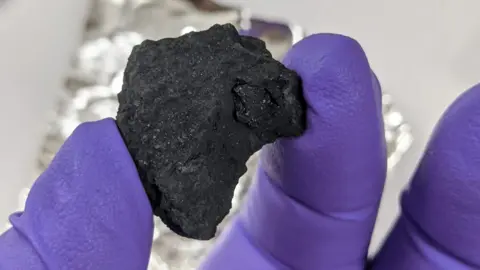Winchcombe meteorite's history revealed by fresh analysis
 BBC
BBCA meteorite that landed in a sheep field was repeatedly smashed apart and reassembled on the journey through space, scientists reveal.
Latest analysis of the Winchcombe meteorite suggests water may have played a role in its violent odyssey.
The meteorite is the first to be found on UK soil for 30 years.
Paper co-author Dr Diane Johnson said research like this helps to understand the Solar System's formation.
She said: "The Winchcombe meteorite is a remarkable piece of space history."
The rock travelled for millions of years before reaching Earth.
Researchers said in its early days the meteorite was an ice-bearing dry rock, but over millions of years ice melted into a ball of mud, which was repeatedly broken apart and reassembled.
Findings suggest it formed from chunks of other rocks cemented together - like broken pieces from multiple jigsaws mashed together - in what is known as breccia.
 University of Glasgow
University of Glasgow Dr Luke Daly, from the University of Glasgow, led the research and said: "We were fascinated to uncover just how fragmented the breccia was within the Winchcombe sample we analysed.
"If you imagine the Winchcombe meteorite as a jigsaw, what we saw in the analysis was as if each of the jigsaw pieces themselves had also been cut into smaller pieces, and then jumbled in a bag filled with fragments of seven other jigsaws.
"However, what we've uncovered in trying to unjumble the jigsaws through our analyses is new insight into the very fine detail of how the rock was altered by water in space," he said.
 NHM
NHMThe first part of the Winchcombe meteorite landed on a driveway in February 2021, shortly after it was spotted as a fireball streaking across the skies.
This specimen was recovered just hours after it entered the Earth's atmosphere.
More fragments were found in a field a few days later.
The Winchcombe meteorite belongs to a rare class of rocks known as carbonaceous chondrites.
They comprise about three per cent of all meteorites collected on Earth and are thought to contain unaltered chemicals from the formation of the Solar System more than four billion years ago.
Analysis of those minerals could help scientists find the answers to questions such as how did the Solar System evolve and how did Earth get its water?
A team of international researchers collaborated on the study, which is published in the journal Meteoritics And Planetary Science.

Follow BBC Gloucestershire on Facebook, X and Instagram. Send your story ideas to us on email or via WhatsApp on 0800 313 4630.
